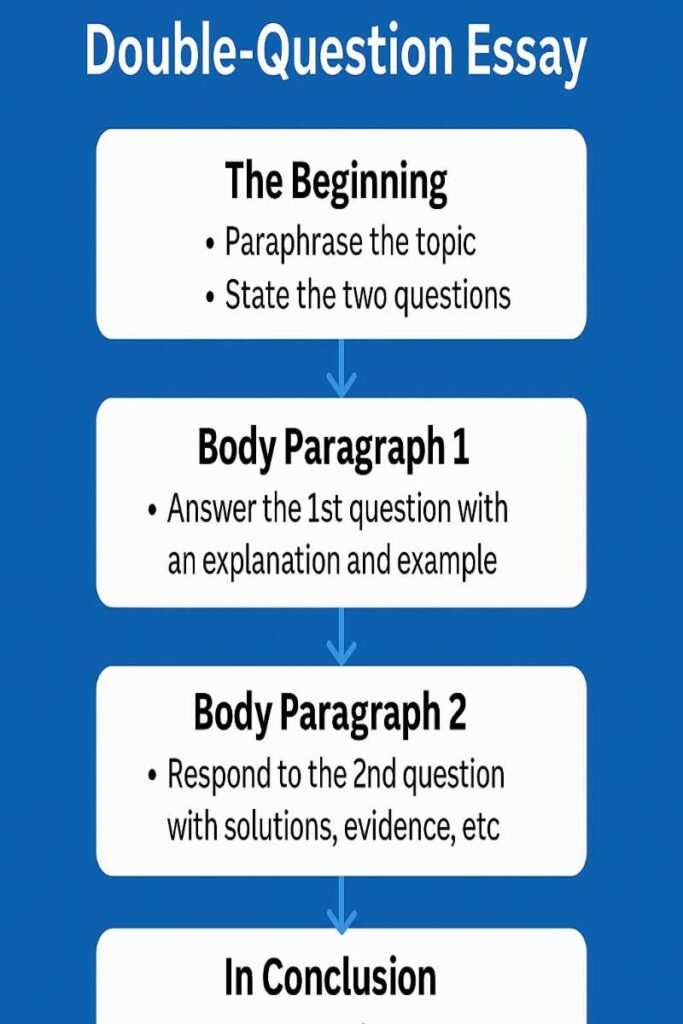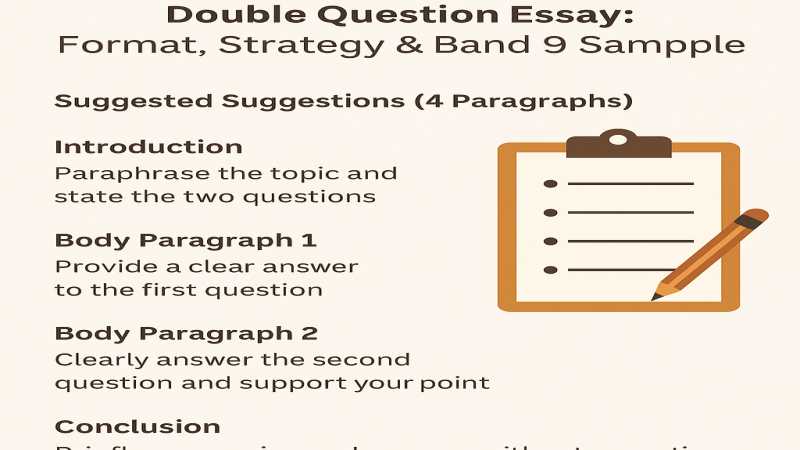The Double Question Essay, sometimes called the Two-Part Question Essay, is one of the trickier types of essays in IELTS Writing Task 2. You have to answer two different questions about the same subject in one essay for these tasks.
You’ll learn the following from this large guide:
- What a double question writing looks like
- The best plan to stick to
- How to give clear answers to both questions
- Good words to start a sentence and connect ideas
- A full Band 9 sample with a description

What is an essay with two questions?
This type of question starts with a short background statement and then asks two straight questions. You need to give each answer the same amount of thought.
Example Question:
People don’t discard as much as they could in many places.
Why don’t some people save things?
What can be done to get people to recycle?
To Spot a Double-Question Essay, Look for These Things:
- After a topic sentence, there are two separate questions
- There was no call to “talk about both sides” or “give your opinion”
- Question types that start with “Why,” “What,” or “How”
– Essay Type Identification: IELTS Writing Task 2 Essay Types – How to Identify and Approach Each One
– Opinion Essay Strategy:
Structure Suggestions for an Essay (4 Paragraphs)
| Goal of the Paragraph | Description |
| The Beginning | Rewrite the subject and ask the two questions |
| Body Sentence 1 | Give a clear answer to the first question, including an example and an explanation |
| Part 2 | Give a reasoned answer to the second question and back it up with evidence |
| In conclusion | Write a short summary of each answer without repeating it word for word |
Breaking Down Each Sentence
Beginning
- Rewrite the subject
- Say that both questions will be answered in the writing
Recycling is still hard to do in many countries, even though people are becoming more concerned about the earth. The reasons why people don’t recycle as much will be looked at in this article, along with some good ideas for getting people to recycle more.

Body Part 1: The First Question
- Provide a clear answer to the first question
- Talk about it and give cases from real life
One reason many people don’t recycle is that they don’t know how to do it. Their actions might not be clear to them about how they affect the earth, or they might not know how to recycle properly. For example, in some rural places, people don’t learn much about how to deal with trash, and bins aren’t properly labelled.
Part 2 of the Body: The Second Question
- Straight answer the second question
- Give a realistic and workable answer
- Show your point with cases
To get more people to recycle, for example, governments should run education programs and improve infrastructure. Putting out recycling bins with clear labels in public places and encouraging kids to recycle can help build an attitude of responsibility. Countries like Germany have high recycling rates thanks to efforts like these that are led by the community.
In the End
- In one or two lines, sum up your main points
- Don’t bring up new thoughts
To sum up, the main reasons why people don’t recycle much are a lack of knowledge and facilities that aren’t up to par. Governments can help people change their behaviour in the long term by putting money into infrastructure and schooling.
Linking Words That Are Often Used in Double-Question Essays
Phrases for Function
- Giving the first reason: One main reason for…, A major reason for this is…
- Giving some examples: To give an example, For example, Like
- Suggesting an answer: To deal with this, one good answer is…
- Adding details: Also, additionally
- Concluding: To sum up, in conclusion, overall
Tip: Make sure the changes are smooth, especially between the two body lines.
Mistakes People Make When Writing Double-Question Essays
- You can only answer one question → To get a high Task Response score, you must answer both parts completely
- Going over the beginning or end of something again → Don’t repeat yourself when you paraphrase thoughts
- Lack of clear paragraph breaks → Each body paragraph should only answer one question
- Not coming up with answers → Don’t just suggest an idea; explain how and why it works
- Use formal, academic English with clear thinking instead of a casual tone or vague examples
This Is an Example of a Band 9 Double-Question Essay
Question:
More and more people are deciding to live alone these days.
Why does this happen?
Is this a trend that is going up or down?
Band 9 Essay
Beginning:
There has been a clear rise in the number of people choosing to live alone over the past few decades. This paper will look at the reasons for this change and argue about whether it is good or bad for society.
Part 1: Why People Choose to Live Alone:
Independence and personal freedom are becoming more and more important, which is a big reason why people choose to live alone. Especially young people value independence and being able to make their own choices without anyone getting in the way. Also, more people can manage to live alone because their finances are better off. For example, rising incomes and easy access to rental markets have made it possible for young workers in many cities to choose privacy and flexibility over living with others.
Second Body Paragraph: Is It Good or Bad?
Some people might see this trend as selfish, but I think it’s a good thing. Living alone helps people become more independent, boosts their confidence, and gives them the chance to learn life skills like planning, cooking, and managing their time. In addition, it often cuts down on family arguments and the stress that comes with living with other people. However, to avoid problems like loneliness, it is important for people to stay socially connected through work, hobbies, or neighbourhood events.
In Conclusion
More people are living alone because they are more independent and can afford to. Overall, this trend could be seen as positive, as long as people keep up good relationships with other people.
Why This Essay Gets Good Grades
| Band | Describe the Band | What It Means |
| Answer to Task | Fully answers both questions with lots of examples and reasons | |
| Cohesion and Coherence | Each piece clearly answers one question and flows into the next one | |
| Lexical Resource | A lot of words, like liberty, mitigate, and self-reliance | |
| How to Write | Correct use of complex sentence forms and a range of tenses |
How to Get Better at Writing Essays with Two Questions
- Take two to three minutes to think about the question. Highlight both questions and write down what they’re about
- Plan your two answers → Before you write, write two bullet points for each question
- Follow the rules for paragraphs → The first body is the question, and the second body is the answer
- Keep track of time → Finish the whole writing in less than 40 minutes
- Ask for feedback → Use Grammarly or ask a teacher to check your spelling and grammar
The Practice Question Is for You
There are many people who think that cell phones are bad for kids.
Why do some people believe this?
Should I agree or not?
Tips for Planning:
- Why: Concerns about health (computer time, sleep), distractions, and dependence
- Thoughts: It might be bad if it’s not regulated; suggest moderate use with parental control
Write your own article in forty minutes and then use the band descriptors to look it over.
Thoughts for Now
The second part of IELTS Writing Task 2 has two questions. At first, writing an essay might seem hard, but it’s easy to get good at if you know the right steps and how to organise them.
Don’t forget:
- Please fully understand both questions
- Answer each one on its own, but together
- True stories and a serious tone are best
- Keep your layout easy to understand and the same
This format doesn’t test your ability to write two separate essays, but how well you can create and connect two ideas.
Call to Action
In IELTS Writing Task 2, which type of question (opinion, conversation, or double question) gives you the most trouble? Tell us in the comments, and we’ll make a plan just for you.

About the AuthorWelcome to TechIELTS. I’m Md. Jahangir Alam, an experienced engineer with over 15 years in electrical and automation systems. Alongside my engineering career, I’ve developed a strong interest in English language learning and IELTS preparation.
I hold a Duolingo English Test score of 135 (IELTS 7.5 equivalent) and am currently pursuing an M.Sc. in Cyber Security from Royal Holloway, University of London. I use my technical background to create clear, structured IELTS learning materials for students and professionals.
👉 Connect on LinkedIn
